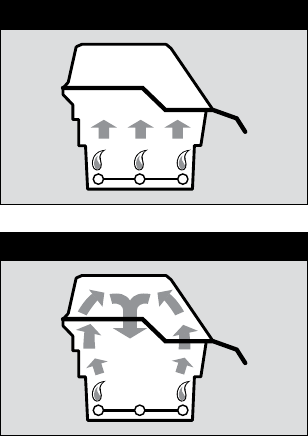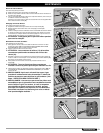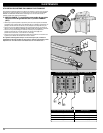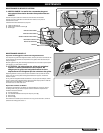Special offers from our partners!

Find Replacement BBQ Parts for 20,308 Models. Repair your BBQ today.

Buy Weber Grill Parts. It couldn't be easier. Find your Weber parts here.

3
GRILLING METHODS
The most important thing to know about
grilling is which cooking method to use for a
specific food, direct or indirect. The difference
is simple: place the food directly over the
heat, or arrange the heat on either side of it.
Using the right method is the shortest route
to great results—and the best way to ensure
doneness safety.
Direct Method
The direct method, similar to broiling,
means the food is grilled directly over the
heat source. For even grilling, food should
be turned once.
The direct method is best for relatively
small, tender pieces of food that cook
quickly, such as hamburgers, steaks, chops,
boneless chicken pieces, fish fillets, shellfish,
and sliced vegetables. Direct grilling is also
necessary to sear meats. Searing creates that
wonderful crisp, caramelized texture where
the food hits the grate. It also adds great
color and flavor to the entire surface. Steaks,
chops, chicken breasts, and larger cuts of
meat all benefit from searing.
To sear meats, place them over direct high
heat for 2 to 5 minutes per side. Smaller
pieces require less searing time. Usually
after searing you finish grilling the food at a
lower temperature. You can finish grilling fast-
cooking foods by the direct method; use the
indirect method for longer-cooking foods.
To set up your gas grill for direct grilling,
preheat the grill with all burners on high.
Place food on the cooking grate, then adjust
all burners to the temperature noted in the
recipe. Close the lid of the grill and lift it only
to turn food or to test for doneness at the
end of the recommended cooking time.
Indirect Method
The indirect method is similar to roasting, but
with the added benefits of that grilled texture,
flavor, and appearance you can’t get from
an oven. To set up your gas grill for indirect
cooking, burners are lit on either side of the
food but not directly beneath it. Heat rises,
reflects off the lid and inside surfaces of the
grill, and circulates to slowly cook the food
evenly on all sides, much like a convection
oven, so there’s no need to turn the food.
The indirect method is best for larger, tougher
foods that require longer cooking times, such
as roasts, whole chickens, and ribs.
To set up your gas grill for indirect grilling,
preheat the grill with all burners on high. Then
adjust the burners on each side of the food
to the temperature noted in the recipe and
turn off the burner(s) directly below the food.
For best results, place roasts, poultry, or large
cuts of meat on a roasting rack set inside a
disposable heavy-gauge foil pan.
For longer cooking times, add water to the
drip pan to keep drippings from burning.
The drippings can be used to make gravies
or sauces.
Direct Method
Indirect Method


















